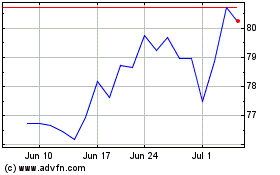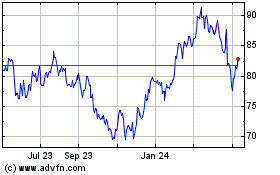Today's Top Supply Chain and Logistics News From WSJ
January 30 2017 - 7:02AM
Dow Jones News
By Paul Page
Sign up:With one click, get this newsletter delivered to your
inbox.
The Hunter Harrison takeover of CSX Corp. may be on a fast
track. The freight railroad is discussing a settlement with the
railroad-industry veteran and the activist investor backing him
that could make Mr. Harrison its chief executive, less than two
weeks after they launched a campaign for influence over the
company. The WSJ's Jacquie McNish, David Benoit and Dana Mattioli
report Mr. Harrison presented his vision for CSX to a group that
included the railroad's two independent directors at a meeting in
Atlanta on Friday. CSX's board has come under pressure to replace
Chief Executive Michael Ward since the railroad's stock surged on
news that Mr. Harrison had resigned as Canadian Pacific Railway
Ltd.'s chief to team up with Paul Hilal, a former top official at
Bill Ackman's Pershing Square Capital Management LP. Mr. Harrison
is a vocal advocate for building a transcontinental railroad in
America, so any action on CSX could be a prelude to a new
rail-industry consolidation effort.
Small-business owners are raising bigger concerns over the
import-tax plan known as border adjustment. The provision included
in an overhaul of the U.S. tax code favored by Republicans in the
House of Representatives promises to upend the direction of trade,
and the WSJ's Ruth Simon and Richard Rubin report some
small-business owners fear it may force them to lay off workers and
raise prices as they cope with higher import costs. The proposal
could benefit firms that export or don't import raw materials or
finished products. Under the plan, imports couldn't be deducted as
a cost of doing business, while exports would be exempted. Big
retailers are fighting it. But the bigger impact may be deeper in
the supply chain: More than 95% of U.S. importers have fewer than
250 employees, according to 2014 U.S. Census data, and several
companies say they don't have the cash reserves to ride out the
changes nor the flexibility to shift production and realign their
supply chains to meet the changed economics of trade.
While trade-war talk grows louder, the existing global battle
over steel shipments shows no signs of cooling off. The European
Union is imposing new tariffs on two steel products originating
from China and Taiwan, the WSJ's Viktoria Dendrinou reports,
escalating tensions between the EU and Beijing over Europe's
oversupplied steel sector. The new tariffs come as the U.S. is
moving forward on its own stronger anti-dumping measures against
Chinese steel. Overcapacity in Europe's steel sector has led to
thousands of job losses in the past year while steel producers
around the world have sought government protection from falling
prices amid a global steel glut. China has said it will eliminate
what it calls "outdated" steel manufacturing capacity by the middle
of this year, but it's unclear so far whether the growing tariffs
will eliminate production or simply send China's manufacturers in
search of new markets.
ECONOMY & TRADE
Trade is having an outsize impact on recent U.S. economic growth
trends. Economic output decelerated in the final three months of
the year to a 1.9% growth rate, the WSJ's Ben Leubsdorf reports,
returning to the stubbornly lackluster pace that has prevailed
through most of the current expansion. The expansion last quarter
reflected decent consumer spending, a rebound for home-building and
stronger business investment in both new equipment and
research-and-development projects -- trends that suggest the
goods-moving economy was picking up steam to close out 2016. And
private inventories came back strong, contributing a full
percentage point to the fourth quarter's growth rate. The strong
imports that contributed to a wider trade deficit subtracted 1.7
percentage points from gross domestic product. But those imports
also signal confidence in the consumer demand and the progress of
the U.S. economy, even as the direction of trade comes under
increasingly heated debate.
QUOTABLE
IN OTHER NEWS
Airlines and airports scrambled over the weekend to adjust
staffing in response to President Donald Trump's immigration order,
while businesses in the Middle East braced for the ban's impact.
(WSJ)
Delta Air Lines Inc. flight delays and cancellations stretched
into a second day after computer problems led to widespread
disruptions. (WSJ)
U.S. factory orders for capital goods excluding defense and
aircraft rose 0.8% in December. (WSJ)
Tesco PLC will buy Booker Group PLC for $4.7 billion in a deal
that combines the U.K.'s largest retailer with its largest food
wholesaler. (WSJ)
Wal-Mart Stores Inc. has failed to settle a foreign-bribery
probe that has stretched for five years and cost the company more
than $820 million. (WSJ)
Teen retailer Wet Seal LLC is closing all its stores after it
was unable to nail down fresh capital or a buyer. (WSJ)
A Chinese phone maker's default on some $166 million in bonds is
roiling the world's largest internet investment marketplace.
(WSJ)
Startup Santa Fe Natural Gas plans to invest heavily in Mexico
following the opening of the country's natural gas market.
(WSJ)
American Airlines Group Inc. projected a revenue turnaround this
year as it closes the costly integration work that has dogged it
since its merger with US Airways. (WSJ)
Colgate-Palmolive Co. is undertaking new plans to boost sales
after lackluster growth in the fourth quarter. (WSJ)
Several Florida ports canceled plans to sign a cooperation pact
with a Cuban delegation after Gov. Rick Scott threatened to cut
their funding. (Miami Herald)
Boeing Co. and its machinists' union agreed to a Feb. 15 date
for a vote on unionization at the company's jet factory in South
Carolina. (Reuters)
Residents near a new CSX Corp. double-stack route through
Washington, D.C., say the expansion has disrupted life in the
neighborhood. (Washington Post)
Members of the International Longshoremen's Association slowed
operations at South Carolina's Port of Charleston to protest
automation efforts. (Charleston Post and Courier)
Truckload carrier Heartland Express Inc.'s fourth-quarter net
profit fell 21% on a 14% decline in revenue. (Cedar Rapids
Gazette)
Wal-Mart plans to spend $1.2 billion over the next 10 years
adding distribution centers in Mexico's Yucatan region. (Yucatan
Times)
Orient Overseas Container Line's trans-Pacific volume soared
30.6% in the fourth quarter while Asia-Europe business grew 28%.
(American Shipper)
Agencies and institutions in Michigan, Ohio, and Pennsylvania
formed the "Smart Belt Coalition" to spur efforts to test and
deploy connected vehicles. (Car & Driver)
ABOUT US
Paul Page is deputy editor of WSJ Logistics Report. Follow him
at @PaulPage, and follow the entire WSJ Logistics Report team:
@brianjbaskin, @jensmithWSJ and @EEPhillips_WSJ and follow the WSJ
Logistics Report on Twitter at @WSJLogistics.
Subscribe to this email newsletter by clicking here:
http://on.wsj.com/Logisticsnewsletter .
Write to Paul Page at paul.page@wsj.com
(END) Dow Jones Newswires
January 30, 2017 06:47 ET (11:47 GMT)
Copyright (c) 2017 Dow Jones & Company, Inc.
Canadian Pacific Kansas ... (NYSE:CP)
Historical Stock Chart
From Aug 2024 to Sep 2024

Canadian Pacific Kansas ... (NYSE:CP)
Historical Stock Chart
From Sep 2023 to Sep 2024
